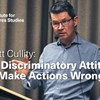accepted
How do we measure well-being?
Stella lives with her family in a villa in a medium-sized town in Sweden. She likes her job but her back is hurting. How do we measure her well-being? Increasing well-being is generally accepted as one
Predicting how US public opinion on moral issues will change from 2018 to 2020 and beyond
Royal Society Open Science, vol. 9, issue 4 Abstract The General Social Survey, conducted every 2 years, measures public opinion on a wide range of moral issues. The data from the 2020 survey are expect
Public services demokratiska uppdrag. Fri åsiktsbildning och offentligt förnuft
Statsvetenskaplig Tidskrift 126:2, 355–372 Abstract The democratic significance of public broadcasting corporations has gained renewed urgency as a result of developments in the outside world and the ong

Garrett Cullity: How Discriminatory Attitudes Can Make Actions Wrong
Research seminar with Garrett Cullity, professor of philosophy at the Australian National University, known for his research on moral philosophy. Abstract In general, otherwise permissible actions do

Garrett Cullity: How Discriminatory Attitudes Can Make Actions Wrong
Research seminar with Garrett Cullity, professor of philosophy at the Australian National University, known for his research on moral philosophy. Abstract In general, otherwise permissible actions do
Environmental Co-governance, Legitimacy, and the Quest for Compliance: When and Why is Stakeholder Participation Desirable?
Journal of Environmental Policy and Planning, 18 (3), 306-323. Abstract Deliberative forms of stakeholder participation have been widely embraced as a key measure for addressing legitimacy deficits and
Completed: Predictions of changes in opinion on moral issues – a cross-cultural test on a new theory
Today, moral questions tend to become more important to voters in many countries. Is it possible to understand - and predict - how the public opinion changes on moral issues?
Garrett Cullity: But Thinking Makes It So: How Discriminatory Attitudes Can Make Actions Wrong
Research seminar with Garrett Cullity, professor of philosophy at the Australian National University, known for his research on moral philosophy. Venue: Holländargatan 13, Stockholm Register here > Ab
Do poorer youth have fewer friends? The role of household and child economic resources in adolescent school-class friendships
Children and Youth Services Review, In Press, Accepted Manuscript. Published online before print August 21, 2015, doi:10.1016/j.childyouth.2015.08.013 Poverty among children and adolescents attracts con
Friendship trust and psychological well-being from late adolescence to early adulthood: A structural equation modelling approach
Scandinavian Journal of Public Health, Volume: 45 issue:3, pp.244-252. doi.org/10.1177/1403494816680784 Abstract Aims:This study explored the sex-specific associations between friendship trust and the p: The findings suggest that young people do not benefit from trustful social relations to the same extent as adult populations. Young women who express impaired well-being run a greater risk of being members of networks characterized by low friendship trust over time.








